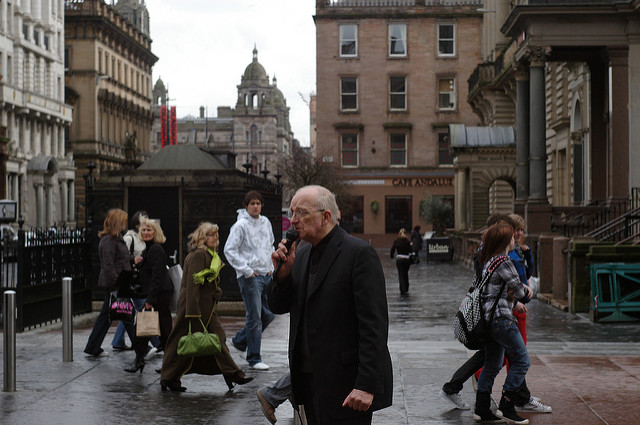Alexander von Koskull reports on how Christian fundamentalists face an inconvenient evidence gap when suggesting that Christians are scared to express their faith in modern Britain.

A street preacher on Buchanan Street, Glasgow. Photo: mot/Flickr
Last week, Conservative MP Fiona Bruce attracted a lot of media coverage after making the claim in the House of Commons that Christians ‘are worried, or even fearful, about mentioning their faith in public.’ Even the Prime Minister sympathised with her statement, intimating that religious liberty could indeed be under threat in Britain, much as Bruce alleges.
But the research to back up Fiona Bruce’s claims isn’t there. Or rather, there is research commissioned by the Church of England on the attitudes of practicing Christians, but it actually suggests the opposite: that Christians do in fact feel comfortable talking about their faith openly.
Bruce is a patron of the Conservative Christian Fellowship, and her comments during Prime Minister’s Questions were intended to echo a report from think tank ResPublica which called for legal amendments that would require employers to accommodate religious beliefs of employees, which it can only do by asserting that such a thing is not already the case, or that there is some kind of public outcry worth responding to. The Church of England’s survey clearly shows there isn’t, and that Bruce’s views do not represent the Christian community as a whole.
In the Study of Practising Christians in England, respondents were asked to record their level of agreement with statements on their practice of faith and relationship to god. The results found that:
- 71% of respondents agreed with the statement – ‘I feel comfortable talking to non-Christians about Jesus Christ’.
- 65% disagreed with the statement – ‘I am afraid of causing offence when I talk to non-Christians about Jesus-Christ’.
- 73% disagreed with the statement – ‘I almost always feel unable to take up opportunities which present themselves to me to talk to non-Christians about Jesus Christ’.
- 76% agreed with the statement – ‘Talking to non-Christians about Jesus Christ is an act of evangelism’.
- Finally, 66% recalled that they had talked about ‘their relationship with Jesus Christ with someone who was not Christian’ in the last month, half of which did so in the last week.
The calls to review the human rights law in relation to religion and belief have also been called into question by the Equality and Human Rights Commission (EHRC), which argued that changing the law so that employers are explicitly required to ‘reasonably accommodate’ employees would be superfluous and would even require employers to privilege the rights of religious people to discriminate against others. The British Humanist Association embraced the EHRC’s findings and welcomes the surmounting evidence which refutes claims that Christians are fearful about expressing their faith in public under current legislation.
It is hard not to see such false claims of victimisation as a small thread in the fabric of Christian groups lobbying for greater autonomy to discriminate against others on religious grounds. They’ve been calling in recent months, both in the UK and other countries, for greater freedom to discriminate in the workplace, schools, and elsewhere.
What the Church of England’s data shows however is that no consensus even exists among Christians that their right to exercise a religion is under threat – and surely that’s because it isn’t, as the recent ECHR report found.
Changes to equality laws are not only unnecessary, but are likely to undermine the existing equal protection of people in the workplace by favouring people with certain religious beliefs over members of the LGBT community, women, and even people of other religions.
If anything, the law should be changed to limit discrimination, particularly in schools. But there is precious little sign of movement in that direction. The Government is currently planning to change the rules so that schools in England can discriminate by religion in 100% of places, with potentially very damaging results for community cohesion and fair access to local schools.
I have just been made to feel very uncomfortable for withdrawing my child from a christingle church service. The school told me that they don’t want this to start a trend where others feel they don’t have to go either. So much for being able to express a choice!
Mandy,
You have to stand up for what you believe in. Your child will see, hear and know about Christmas and the Christian story behind that. Your child should be able to choose for her/himself what indoctrination s/he wants to be a part of. Forcing her/him to attend a church service is not allowing that choice. Perhaps the school should not use a church service if they are worried others will begin to join the trend!
Mandy, sorry to hear that. It’s not like that everywhere. I withdrew my son from a christingle service (at his request), the school was fine with it and he was happy to start his Christmas holiday earlier than would have happened otherwise. Exercise your right to withdraw, even if others don’t “get it”. Happy Christmas!
I am opposed to selection for schools by religious adherence. This seems obviously prejudicial to those who have beliefs by which they seek to live a good life, but where those beliefs are not necessarily aligned to a specific religion. I am happy to support the BHA position on this issue.